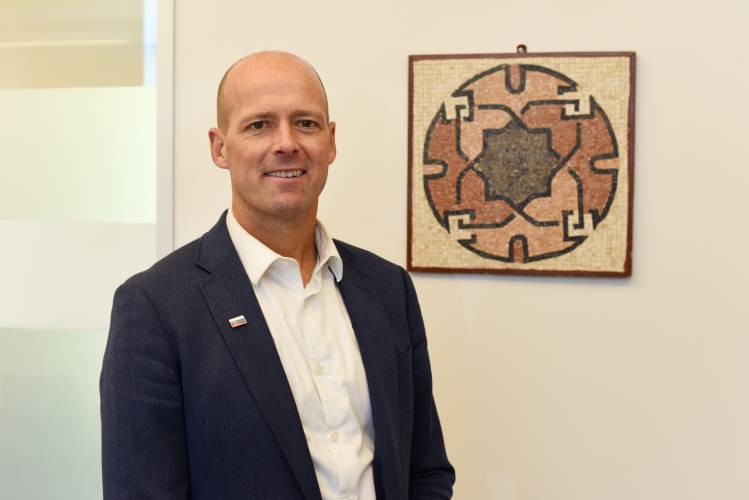Faith Matters: Where can we find universal truths?: There may be some futility in the search, but not in the aspiration to ‘be worthy’

Jan Flaska is Dean of spiritual and ethical life at Deerfield Academy. STAFF PHOTO/PAUL FRANZ
| Published: 05-09-2025 11:53 AM |
The death of Papà Francesco — Pope Francis — has caught my attention for many reasons, not the least of which is the fact that he embodied and lived out the claim of a Roman Catholic universal truth that is intended to be both accessible to and attainable for every human being. As a teacher of religious studies, philosophy and ethics, and as a non-ordained dean of spiritual life, I am fascinated with the prospect that there may be some way in which all of us — yes, all of us — can embrace shared values and the colloquial common ground. In the spirit of those three realms — religious studies, philosophy and ethics — I offer these three named and representative, respectively, universal truths: natural law, human rights, and deontology.
Every religion, every philosopher, and every moral conundrum seeks clarity in a kind of resolution that speaks truth. At Deerfield Academy, where I live and work, we both speak and seek to live out the adage to “be worthy,” in itself a promotion to not just do good but to be good in some referential and reverential way, primarily to those that came before us. I can get behind that promotion. History teaches. Stories and experiences illuminate. We live out our lives as retrospective meaning-makers, first asking ourselves “what did we do before?” each time we find ourselves in the midst of uncertainty when wondering “what shall we do now?” The past prepares us for the present. For the community at Deerfield Academy, being worthy is a kind of true north as we seek to find shared — universal — values in the community in which we live.
For Muslims, universal truth means an introspective reckoning is in order, and an eternal reckoning awaits. Natural law accepts authority and hierarchy as an efficient and prudent path forward. Here’s a question: If “jahannam” — Hell — does not exist, can there be justice? At the Day of Judgment, we are the defendant standing before the judge.
For politicians, human rights are immutable, named in a collective convening of those who seek to enshrine that which is owed to all. The United Nations Declaration of Human Rights states: “Whereas recognition of the inherent dignity and of the equal and inalienable rights of all members of the human family is the foundation of freedom, justice and peace in the world ... [we proclaim] this Universal Declaration of Human Rights as a common standard of achievement for all peoples and all nations.” Even if the Declaration of Independence’s words are archaic, there is a speck of truth all might find in the declaration that “all … are created equal.”
For citizens of the temporal world, respecting the innate worth and dignity of all human beings is our duty, so to speak, where any life lived has an equivalence to every life living. In Kantian Ethics, named for Immanuel Kant, the author of this secular idea of an universal moral truth, truth was anchored in the belief that we all share a good will — a common expression of unified and innate morality. To borrow from a sports-drink ad, “is it in you?” Kant says yes.
These are universal truths, as expressed by some. Can they be expressed by all?
It may not be surprising for me to say I fail others too frequently. It may be that 18-year-olds, at times, choose self-interest ahead of community. One might turn a blind eye to suffering, or one might be unwilling to share excessive talent and goods with others. Can we be perfect? Is there such a thing as perfection?
Of course not. That is the universal story of what it means to be human. This is my question to the students, to you, and to me: Is there universal truth in any of the spaces we seek it? In religion, in philosophy, in ethical comportment? There may be some futility in the search, but not in the aspiration to “be worthy.” It is possible, and that is a true story.
Article continues after...
Yesterday's Most Read Articles
 22-year-old farmworker airlifted to hospital after tractor accident in Sunderland
22-year-old farmworker airlifted to hospital after tractor accident in Sunderland
 Real Estate Transactions: Aug. 8, 2025
Real Estate Transactions: Aug. 8, 2025
 Learning more about the Connecticut River’s natural filters: Research focusing on freshwater mussels
Learning more about the Connecticut River’s natural filters: Research focusing on freshwater mussels
 E-bike rider sustains broken ankle in South Deerfield collision with SUV
E-bike rider sustains broken ankle in South Deerfield collision with SUV
 After delays, Beacon of Light Preschool to open in Greenfield
After delays, Beacon of Light Preschool to open in Greenfield
 Court awaits psych evaluation in Greenfield murder case
Court awaits psych evaluation in Greenfield murder case
Jan Flaska is the Dean of Spiritual and Ethical Life at Deerfield Academy. Deerfield Academy was founded in 1797 and, to this day, continues to embrace a community of learners coming together to encounter challenging ideas, formative learning, and, perhaps, truth.






 Smack Dab in Greenfield: New open mic night celebrates queer voices
Smack Dab in Greenfield: New open mic night celebrates queer voices World premiere to open new season: UMass Fine Arts Center 50th anniversary season includes big names across genres
World premiere to open new season: UMass Fine Arts Center 50th anniversary season includes big names across genres ‘Gentle creatures’ that make us better people: Montague farmer transforms sheep wool into crafts using Iron Age technology
‘Gentle creatures’ that make us better people: Montague farmer transforms sheep wool into crafts using Iron Age technology Voices ‘In Defiance’: New book highlights 20 lesser known abolitionists
Voices ‘In Defiance’: New book highlights 20 lesser known abolitionists
